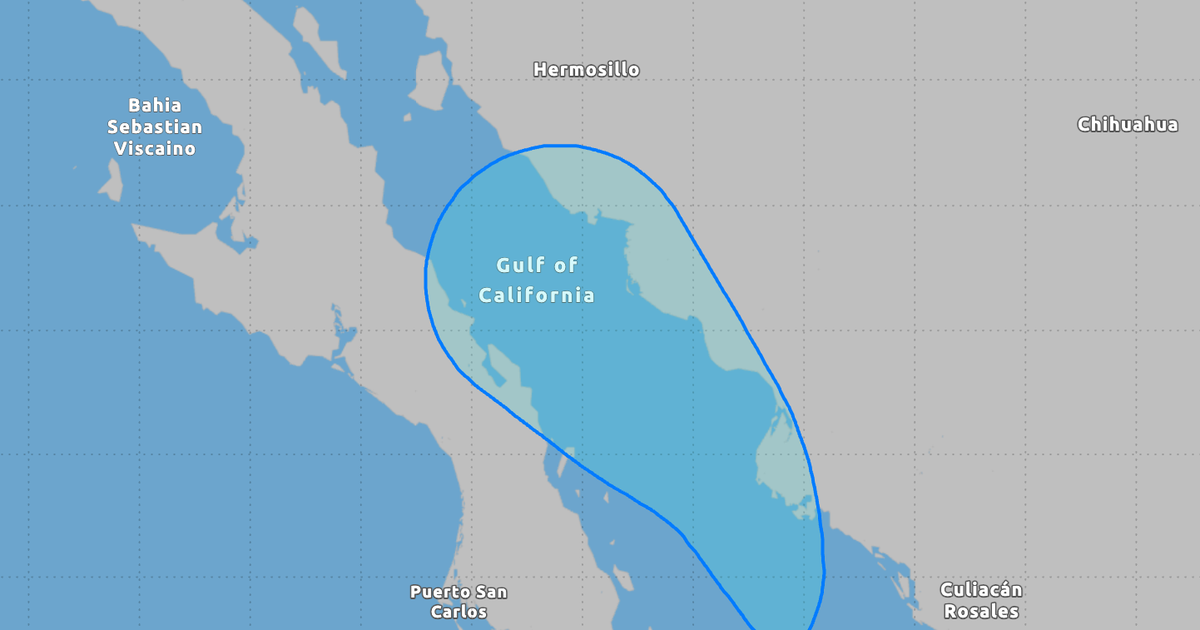CBS News
Military members attacked, roads blocked with burning vehicles in Mexican cartel stronghold

Mexican authorities said Thursday there have been attacks on military personnel and roads blocked with vehicles in northern Sinaloa state.
The state police department said the violence broke out in an area just north of the state capital, Culiacan. The state is home to the drug cartel of the same name, and similar violence has broken out in the past whenever a cartel leader has been arrested.
However, federal authorities said they had no immediate information on any such arrest.
Local media showed images of burning vehicles blocking roads.
“We are aware that military personnel suffered an attack,” the Sinaloa state police department wrote in its social media accounts. “We are also aware that roads have been blocked with vehicles.”
State Gov. Rubén Rocha wrote that assailants had set two vehicles on fire “with the aim of blocking authorities.” He called for calm, but did not specify the motives of the attack or if there were victims.
Roadblocks were later reported in another district where Ovidio Guzman, son of imprisoned drug lord Joaquín “El Chapo” Guzmán, was arrested in January 2023 before being extradited to the United States.
IVAN MEDINA/AFP via Getty Images
Local media showed video and photos of the vehicles in flames. Cartels in Mexico often use that tactic to prevent police or military units from reaching a given area.
In another social media post, police said that authorities had removed vehicles from a highway near the community of Limón de Los Ramos.
Despite the chaos, the Secretary of Public Education in Sinaloa released a statement Thursday night saying classes would be held as planned on Friday.
Cartel leaders detained in U.S.
There have been fears that wider violence might break out in Sinaloa following recent detentions of top Sinaloa cartel leaders in the U.S.
In late July, Joaquín Guzmán López, one of El Chapo’s sons, apparently kidnapped Ismael “El Mayo” Zambada – an older drug boss from a rival faction of the cartel – forcing him onto the plane and flying him north.
The younger Guzmán had apparently planned to turn himself in, and took the elder Zambada along for reasons that are not known.
Earlier this month, federal prosecutors issued a statement saying “an arrest warrant has been prepared” against Guzmán for kidnapping.
Mexico’s state prosecutor’s office on Thursday urged U.S. authorities to “urgently” clarify the legal status and whereabouts of Ovidio Guzman, suggesting his case was linked to Zambada’s abduction.
It said in a statement that Ovidio Guzman was taken out of U.S. prison on July 23, two days before the arrest of his brother and Zambada.
The US ambassador to Mexico, Ken Salazar, said on July 26 that Ovidio Guzman remained in U.S. custody without elaborating on his whereabouts.
Experts including former U.S. Drug Enforcement Administration agent Mike Vigil suspect that Guzman Lopez gave up Zambada in exchange for benefits for himself and his brother Ovidio.
Zambada appeared in a Texas court this month in a wheelchair and pleaded not guilty to charges of drug trafficking, money laundering and conspiracy to commit murder.
Guzman Lopez was transferred to Chicago where he denied drug trafficking charges.
Only one of El Chapo’s sons accused of cartel links remains free — Ivan Archivaldo.
The United States has offered a reward $10 million for information leading to his arrest.
AFP contributed to this report.
CBS News
Man arrested on murder charge 14 years after victim vanished in Virginia

Police arrested a man on murder charges this month, 14 years after he allegedly killed a man in Virginia, but the victim’s body has never been found.
Shane Ryan Donahue, a Virginia man, is presumed deceased, the Prince William County Police Department said Tuesday. He was last seen leaving his parents’ home in Nokesville, Virginia, on March 22, 2010. Donahue, 23, was headed to his house in Nokesville, but never made it there.
Donahue was added to the National Missing and Unidentified Persons System after he vanished. According to records, Donahue did not have a car and regularly got rides from friends. He frequented Washington, D.C., Baltimore, Fauquier County, Virginia, and Northern Virginia.
The case stumped investigators, who followed a number of leads over the years. This spring, detectives reactivated the investigation and started looking at every detail of the case from scratch, officials said. They revisited people who had been interviewed during the initial investigation and reviewed “digital evidence in greater detail due to advances in analytical technology and modern police investigative practices,” according to a news release.
Officers said Donahue was last seen leaving his parents’ home with Timothy Sean Hickerson, now a 43-year-old Florida resident. Investigators connected Hickerson to a burglary at Donahue’s home that happened just days before the Virginia man disappeared.
Detectives got an arrest warrant this month and, with the help of Florida’s Flagler County Sheriff’s Office, Hickerson was taken into custody in Palm Coast, Florida. Hickerson was charged with murder and burglary, is now set to be extradited to Virginia.
CBS News
Trump created the controversial $10,000 SALT deduction cap. Now he wants to end it.

Former President Donald Trump, an avowed proponent of tax cuts, is floating the idea of reversing a measure passed during his tenure in the White House that effectively raised taxes for many U.S. homeowners.
In a post Tuesday on Truth Social, Trump suggested he would scrap a $10,000 cap on deducting state and local taxes (SALT) that was passed as part of the 2017 Tax Cuts and Jobs Act — a massive revamp that he has said boosted economic growth.
Now, in the run-up to the November election, Trump said in the post he would “get SALT back, lower your taxes, and so much more,” although he stopped short of offering details. Trump made the post ahead of a speech he’s giving Wednesday at the Nassau Coliseum on Long Island.
Trump’s new proposal for getting rid of his $10,000 SALT deduction cap comes as the presidential hopeful is pitching several additional tax cuts that would, if enacted, reduce taxes for major groups of voters. He’s also vowed to eliminate taxes on Social Security benefits, a pledge that could get support from the nation’s senior citizens, as well as to end income taxes on tipped workers and on overtime pay, ideas that would help lower- and middle-income Americans.
Yet Trump’s reversal on the SALT deduction has sparked skepticism from lawmakers as well as economists and policy experts.
“So … now Trump is against the SALT tax cap which *checks notes* is a key part of the — only — major piece of legislation passed during his administration?” noted Chris Koski, a political science professor at Reed College in Portland, Oregon, on X.
Rep. Tom Suozzi, a Democrat from Nassau, Queens, said in a statement on Wednesday that he is “happy that the former president is saying that he has finally reversed his devastating decision in 2017 to cap the State and Local Tax (SALT) deduction.” He also urged Trump to convince Republican lawmakers to vote to restore the full deduction “if he is truly serious.”
The SALT deduction cap “has been a body blow to my constituents for the past 7 years,” Suozzi added.
Senator Chuck Schumer, a Democrat from New York, wrote on X,”Donald Trump took away your SALT dedications and hurt so many Long Island families. Now, he’s coming to Long Island to pretend he supports SALT. It won’t work.”
Asked for details about Trump’s proposal to restore the SALT writeoff, a spokeswoman for the Trump campaign told CBS MoneyWatch: “While his pro-growth, pro-energy policies will make life affordable again, President Trump is also going to quickly move tax relief for working people and seniors.”
Here’s what to know about the SALT deduction.
What is the SALT deduction?
The state and local tax deduction allows taxpayers who itemize to deduct property taxes, sales taxes and state or local income taxes from their federal income taxes. Prior to the Tax Cuts and Jobs Act, there was no limit on how much people could deduct through the SALT deduction.
But the 2017 tax overhaul passed under Trump limited the deduction to $10,000 – a blow to many homeowners in states with high property taxes, many of which are Democratic leaning. At the time of the law’s passage, the Treasury Department estimated that almost 11 million taxpayers in high-tax states like New York and New Jersey would forfeit $323 billion in deductions.
Who benefits from the SALT deduction?
Homeowners with high property taxes, such as people in New York, New Jersey and California, were the biggest beneficiaries of the the full SALT deduction.
But some experts also noted that the SALT deduction primarily put more money in the pockets of higher-earning Americans. About 80% of the full SALT deduction had helped people earning more than $100,000 a year, according to the Tax Foundation.
What happened after Trump capped the SALT deduction at $10,000?
The limit has increasingly impacted middle-class homeowners across the U.S. because of rising property taxes and incomes. Some lawmakers have also sought to either repeal or increase the SALT cap, but none of those efforts have borne fruit.
Earlier this year, some lawmakers sought to double the SALT deduction cap to $20,000 for married couples, with the change retroactive for the 2023 tax year. But that bill was blocked in the House in February.
Won’t the SALT deduction cap expire anyway?
Yes, the SALT deduction cap is a provision that’s due to expire in 2025, as are many other parts of the Tax Cuts and Jobs Act, such as a reduction of the individual tax brackets. But Trump has previously indicated he wants to extend the provisions in his signature tax law.
How much would it cost the U.S. to repeal the SALT deduction cap?
It won’t be cheap, according to the the Committee for a Responsible Federal Budget, a think tank that focuses on budget and policy issues.
Eliminating the $10,000 deduction limit “would increase the cost of extending the 2017 Tax Cuts and Jobs Act (TCJA) by $1.2 trillion over a decade,” the group estimates, adding that such a measure would be a “costly mistake.”
Extending the TCJA’s tax cuts would increase the nation’s deficit by $3.9 trillion over the next decade, the group estimates. By adding in a expiration or repeal of the SALT deduction cap, that would grow to $5.1 trillion, it added.
“Lawmakers should not extend the TCJA without a plan to – at a minimum – offset the costs of extension, but ideally the plan would raise revenues relative to current law and help put the nation’s debt on a better trajectory,” the group said in a statement.
CBS News
What Kamala Harris told Latinos at Congressional Hispanic Caucus event

Watch CBS News
Be the first to know
Get browser notifications for breaking news, live events, and exclusive reporting.









